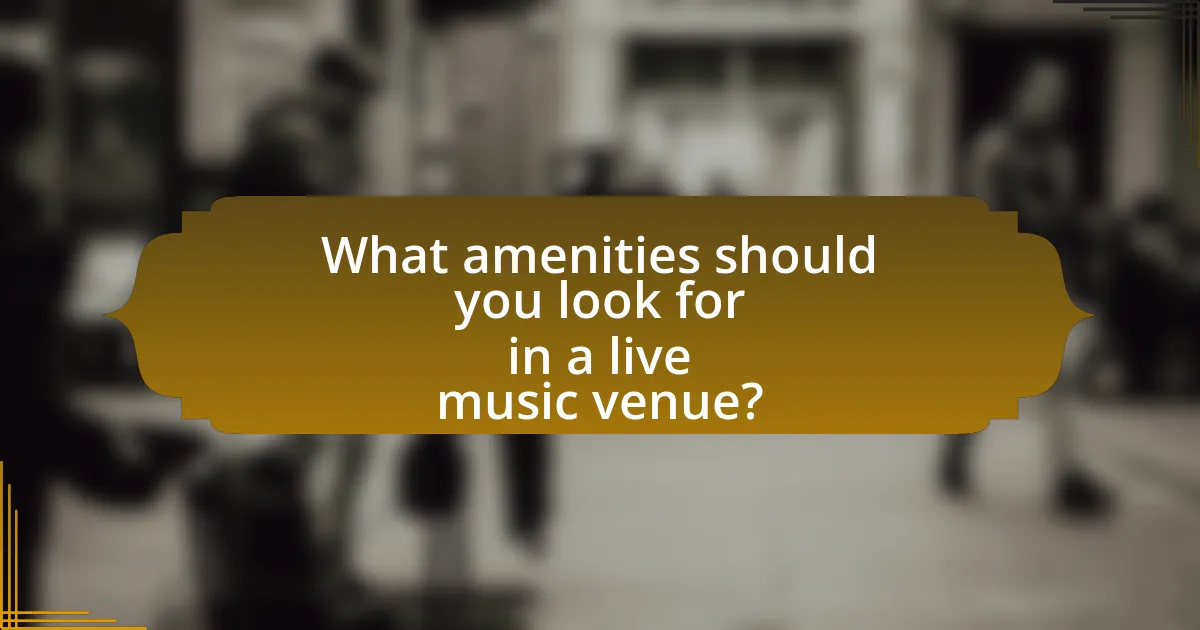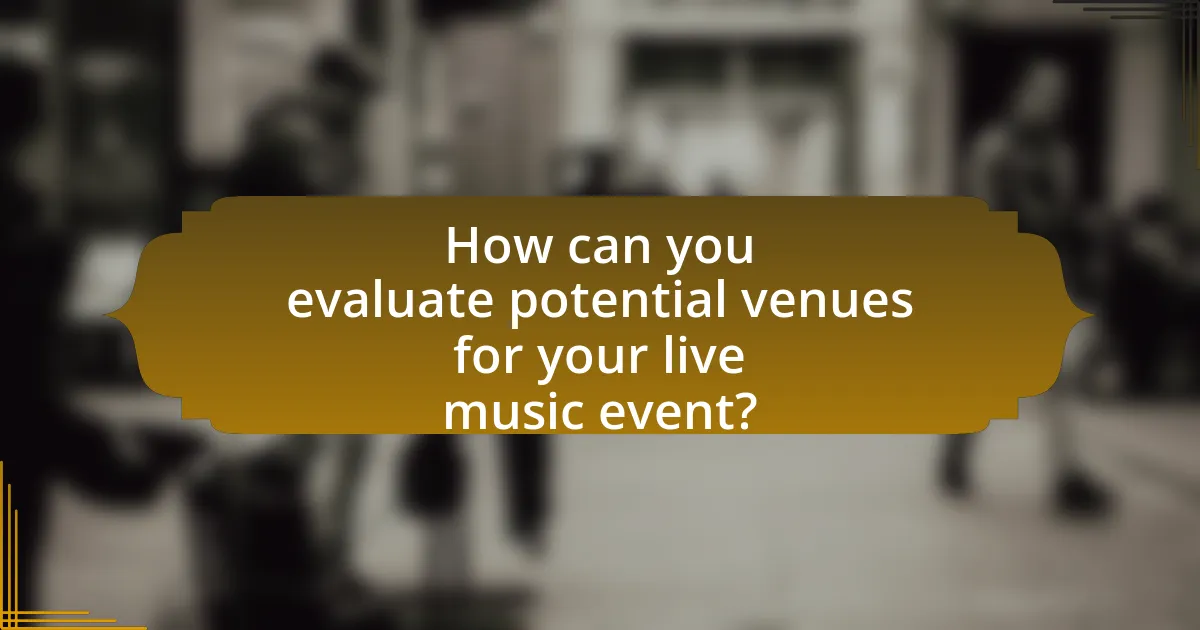The article focuses on the essential factors to consider when selecting a venue for live music events, emphasizing location, capacity, acoustics, amenities, and budget. It discusses how venue size impacts audience experience and outlines ideal capacities for various music genres. The significance of venue layout, accessibility, and the advantages of urban versus rural locations are also examined. Additionally, the article highlights the importance of sound quality, technical facilities, and the role of catering and transportation services in enhancing the overall event experience. Best practices for evaluating potential venues and involving team members in the selection process are provided to ensure a successful live music event.

What factors should you consider when choosing a venue for your live music event?
When choosing a venue for your live music event, consider factors such as location, capacity, acoustics, amenities, and budget. The location should be accessible to your target audience, ideally in a central area with good transportation links. Capacity is crucial; the venue must accommodate the expected audience size without being too large or too small, as this affects the atmosphere and ticket sales. Acoustics play a significant role in sound quality; venues designed for music performances typically have better sound systems and layouts. Amenities, including parking, restrooms, and food and beverage options, enhance the overall experience for attendees. Lastly, budget constraints will determine the feasibility of the venue, including rental costs and additional expenses for services like security and equipment rental. These factors collectively ensure a successful live music event.
How does the size of the venue impact your event?
The size of the venue directly impacts the event by influencing audience capacity, atmosphere, and logistical considerations. A larger venue can accommodate more attendees, which may enhance the energy and excitement of a live music event, but it can also lead to a less intimate experience. Conversely, a smaller venue fosters a closer connection between performers and the audience, enhancing engagement but limiting attendance. According to a study by Eventbrite, events held in smaller venues often report higher satisfaction rates among attendees due to the personal experience, while larger venues may require more complex logistics, such as sound management and crowd control, to ensure a successful event.
What is the ideal capacity for different types of live music events?
The ideal capacity for different types of live music events varies significantly based on the genre and nature of the performance. For intimate acoustic performances, a capacity of 50 to 200 attendees is ideal, allowing for a close connection between the artist and audience. In contrast, small to mid-sized bands typically perform well in venues accommodating 200 to 1,000 people, which provides a balance between intimacy and energy. Larger concerts, particularly for popular genres like rock or pop, often require venues with capacities ranging from 1,000 to 10,000 attendees to create a vibrant atmosphere. Major festivals and large-scale events can attract crowds exceeding 10,000, necessitating outdoor spaces or large arenas to accommodate the audience. These capacity ranges are supported by industry standards and historical attendance data from various live music events.
How does venue layout affect audience experience?
Venue layout significantly affects audience experience by influencing sightlines, acoustics, and crowd flow. A well-designed layout ensures that all attendees have a clear view of the stage, which enhances engagement and enjoyment. For instance, venues with tiered seating or sloped floors improve visibility compared to flat layouts. Additionally, the arrangement of seating and standing areas can impact sound distribution; venues designed with acoustics in mind, such as those with curved walls, can enhance sound quality. Research indicates that audience satisfaction is higher in venues where layout facilitates easy movement and access to amenities, reducing congestion and improving overall comfort.
What role does location play in venue selection?
Location is a critical factor in venue selection as it directly influences accessibility, audience turnout, and overall event success. A centrally located venue typically attracts more attendees due to ease of access via public transportation and proximity to parking facilities. For instance, a study by the Event Marketing Institute found that 70% of attendees consider location a key factor in their decision to attend an event. Additionally, the surrounding environment can enhance the event experience; venues in vibrant areas may offer more entertainment options, which can increase attendance and engagement. Thus, the strategic choice of location can significantly impact the effectiveness and appeal of a live music event.
How accessible should the venue be for your audience?
The venue should be highly accessible for the audience to ensure maximum attendance and inclusivity. Accessibility includes features such as wheelchair ramps, elevators, designated seating for individuals with disabilities, and clear signage. According to the Americans with Disabilities Act (ADA), venues must meet specific standards to accommodate individuals with disabilities, which can enhance the overall experience for all attendees. Ensuring that the venue is accessible not only complies with legal requirements but also demonstrates a commitment to inclusivity, potentially increasing audience size and satisfaction.
What are the advantages of urban versus rural venues?
Urban venues offer advantages such as greater accessibility, larger audiences, and more diverse amenities compared to rural venues. Urban locations typically have better transportation options, including public transit, which facilitates attendance. Additionally, urban areas often host a higher population density, leading to a larger potential audience for live music events. For instance, cities like New York and Los Angeles have vibrant music scenes that attract both local and touring artists, enhancing the overall experience for attendees. Furthermore, urban venues frequently provide a variety of nearby services, such as restaurants and hotels, which can enhance the convenience for event-goers. In contrast, rural venues may lack these features, resulting in lower attendance and fewer amenities.
Why is the venue’s acoustics important for live music?
The venue’s acoustics are crucial for live music because they directly influence sound quality and audience experience. Good acoustics ensure that sound waves are distributed evenly throughout the space, allowing for clarity and balance of instruments and vocals. For instance, venues with poor acoustics can lead to muddled sound, where frequencies overlap and distort, making it difficult for the audience to appreciate the performance. Studies have shown that venues designed with acoustic principles in mind, such as the use of sound-absorbing materials and strategic layout, can enhance the overall listening experience, leading to higher audience satisfaction and engagement.
What features contribute to good acoustics in a venue?
Good acoustics in a venue are primarily contributed by features such as room shape, surface materials, and sound absorption characteristics. The shape of the room, particularly if it is designed to minimize parallel walls, helps reduce sound reflections that can cause echoes. Additionally, the use of sound-absorbing materials like carpets, curtains, and acoustic panels can significantly enhance sound quality by reducing reverberation. Research indicates that venues with a combination of these features can achieve a balanced sound environment, which is essential for live music performances. For example, the Sydney Opera House is renowned for its acoustic design, which incorporates these principles to create an optimal listening experience.
How can you assess a venue’s sound quality before booking?
To assess a venue’s sound quality before booking, conduct an on-site visit to evaluate the acoustics and sound system. During the visit, listen for clarity and balance of sound across different areas of the venue, paying attention to how sound travels and whether it becomes distorted or muffled. Additionally, inquire about the venue’s sound equipment specifications, including the type of speakers, mixing consoles, and microphones used, as these directly impact sound quality. Research shows that venues with professional-grade sound systems and proper acoustic treatment significantly enhance the listening experience, making it crucial to verify these details before finalizing a booking.

What amenities should you look for in a live music venue?
When selecting a live music venue, essential amenities to consider include sound quality, seating capacity, accessibility, and restroom facilities. High-quality sound systems are crucial for delivering an optimal auditory experience, as poor acoustics can detract from performances. Adequate seating capacity ensures that the venue can accommodate the expected audience size, while accessibility features, such as ramps and designated seating, are important for inclusivity. Additionally, clean and sufficient restroom facilities enhance the overall comfort of attendees. These amenities collectively contribute to a positive experience for both performers and audiences, making them vital considerations when choosing a venue.
How do technical facilities affect your event’s success?
Technical facilities significantly impact an event’s success by ensuring seamless execution and enhancing attendee experience. High-quality audio-visual equipment, reliable internet connectivity, and adequate lighting are essential for delivering engaging performances and presentations. For instance, a study by Eventbrite found that 70% of attendees rated sound quality as a critical factor in their overall satisfaction at live events. Additionally, venues equipped with advanced technical facilities can accommodate various production needs, allowing for creative flexibility and reducing the risk of technical failures that could disrupt the event.
What equipment should the venue provide for sound and lighting?
The venue should provide a professional sound system, including speakers, microphones, and mixing consoles, as well as appropriate lighting equipment such as stage lights and control systems. A high-quality sound system ensures clear audio delivery, which is essential for live music events, while effective lighting enhances the visual experience and sets the mood. According to industry standards, venues hosting live music should have equipment that meets the needs of various genres and performance styles, ensuring versatility and quality.
How important is the availability of a stage and backstage area?
The availability of a stage and backstage area is crucial for the success of a live music event. A designated stage provides a focal point for performances, ensuring visibility and acoustics that enhance the audience’s experience. The backstage area is equally important as it allows performers to prepare, store equipment, and manage logistics without disrupting the audience. Research indicates that venues with well-designed stages and backstage facilities can significantly improve performance quality and audience satisfaction, as seen in studies conducted by the National Endowment for the Arts, which highlight the correlation between venue infrastructure and event success.
What additional services can enhance your event experience?
Additional services that can enhance your event experience include professional event planning, catering, audiovisual support, and transportation services. Professional event planning ensures that all logistical aspects are managed efficiently, allowing for a seamless experience. Catering services provide high-quality food and beverage options, which can significantly improve guest satisfaction. Audiovisual support, including sound systems and lighting, enhances the overall atmosphere and engagement during live performances. Transportation services facilitate easy access to the venue, ensuring that attendees arrive on time and comfortably. These services collectively contribute to a more enjoyable and memorable event experience.
How can catering and bar services impact your event?
Catering and bar services significantly impact your event by enhancing guest satisfaction and overall experience. Quality food and beverages can elevate the atmosphere, encouraging social interaction and enjoyment among attendees. According to a survey by Eventbrite, 70% of event-goers stated that food and drink options are a crucial factor in their decision to attend an event. Additionally, well-executed catering can reflect the theme of the event, creating a cohesive experience that resonates with guests. Therefore, the choice of catering and bar services directly influences the success and memorability of your event.
What role does parking and transportation play in venue selection?
Parking and transportation are critical factors in venue selection for live music events, as they directly influence attendee accessibility and convenience. A venue with ample parking options and efficient transportation links can significantly enhance the overall experience for guests, leading to higher attendance rates. Studies indicate that 70% of event attendees consider parking availability as a key factor in their decision to attend an event. Additionally, venues located near public transportation hubs can attract a broader audience, including those who may not drive. Therefore, the presence of reliable parking and transportation options is essential for maximizing attendance and ensuring a successful event.

How can you evaluate potential venues for your live music event?
To evaluate potential venues for your live music event, assess factors such as capacity, acoustics, location, and amenities. Capacity determines the audience size the venue can accommodate, which is crucial for ticket sales and atmosphere. Acoustics impact sound quality; venues with good acoustics enhance the audience’s experience. Location affects accessibility for attendees and can influence ticket sales; venues in high-traffic areas typically attract more visitors. Amenities, including stage size, lighting, and sound equipment, are essential for the performance quality and overall event success. For instance, a venue with a capacity of 500 and excellent acoustics can significantly enhance the experience compared to a larger venue with poor sound quality.
What steps should you take during a venue visit?
During a venue visit, assess the space’s layout, capacity, and acoustics to ensure it meets the requirements for your live music event. First, evaluate the stage area for size and visibility, as a well-placed stage enhances audience engagement. Next, check the seating arrangement and overall capacity to confirm it aligns with your expected attendance, as venues often have specific limits that must be adhered to. Additionally, inspect the acoustics by listening to sound quality in various areas, as poor acoustics can detract from the performance experience. Verify the availability of essential amenities such as restrooms, parking, and accessibility features, which are crucial for guest comfort. Finally, discuss logistical details with the venue manager, including load-in times, technical support, and any restrictions on sound levels, to ensure a smooth event execution.
What specific aspects should you inspect during a venue tour?
During a venue tour, you should inspect the layout, acoustics, lighting, accessibility, and amenities. The layout determines the flow of the event and audience engagement, while acoustics affect sound quality, which is crucial for live music. Lighting impacts the atmosphere and visibility, and accessibility ensures all guests can enter and enjoy the event. Amenities, such as restrooms and concessions, contribute to the overall experience. Each of these aspects plays a vital role in the success of a live music event, as they directly influence audience satisfaction and logistical efficiency.
How can you gauge the venue staff’s professionalism and support?
You can gauge the venue staff’s professionalism and support by observing their communication skills, responsiveness, and demeanor during initial interactions. Professional staff will provide clear, timely answers to inquiries and demonstrate a willingness to assist with specific needs, reflecting their commitment to customer service. For instance, venues with high ratings often highlight staff professionalism in reviews, indicating that attentive and knowledgeable personnel contribute significantly to a positive event experience.
What questions should you ask the venue management?
You should ask venue management about capacity, availability, rental fees, sound and lighting equipment, parking options, and any restrictions on noise or alcohol. These questions are essential to ensure the venue meets the specific needs of your live music event. For instance, knowing the capacity helps determine if the venue can accommodate your expected audience, while understanding rental fees allows for budget planning. Additionally, inquiring about sound and lighting equipment ensures that the venue can support the technical requirements of the performance.
How can you clarify pricing and contract terms effectively?
To clarify pricing and contract terms effectively, communicate directly with the venue management to ensure all costs are transparent. This includes discussing rental fees, additional charges for services, and payment schedules. Clear documentation of these terms in a written contract is essential, as it serves as a legal reference and minimizes misunderstandings. According to a study by the American Bar Association, clear contracts reduce disputes by up to 70%, highlighting the importance of precise language and detailed descriptions in agreements.
What should you know about the venue’s cancellation policy?
The venue’s cancellation policy outlines the terms under which a booking can be canceled and any associated penalties. Typically, venues may require a notice period for cancellations, which can range from a few days to several weeks, and may impose fees based on how close the cancellation is to the event date. For example, a venue might charge a full fee if canceled within 30 days of the event, while a partial refund may be available for cancellations made earlier. Understanding these specifics is crucial for event planners to avoid unexpected costs and ensure financial planning aligns with potential changes.
What are some best practices for selecting the perfect venue for your live music event?
To select the perfect venue for your live music event, prioritize factors such as location, capacity, acoustics, and amenities. A central location enhances accessibility for attendees, while the venue’s capacity must align with expected attendance to ensure comfort and atmosphere. Acoustics are crucial; venues with good sound quality enhance the audience’s experience. Additionally, consider amenities like parking, restrooms, and stage setup, as these contribute to the overall event success. Research shows that venues with optimal acoustics and appropriate capacity can significantly impact audience satisfaction and event success rates.
How can you involve your team in the venue selection process?
Involving your team in the venue selection process can be achieved by organizing collaborative brainstorming sessions where team members can share their preferences and ideas. This approach encourages diverse input, ensuring that various perspectives are considered, which can lead to a more suitable venue choice. Additionally, assigning specific roles to team members, such as researching potential venues or evaluating logistics, can enhance engagement and accountability. Research shows that team involvement in decision-making processes increases satisfaction and commitment to the final choice, as evidenced by a study published in the Journal of Organizational Behavior, which highlights the positive impact of participative decision-making on team dynamics.
What resources can help you compare different venues effectively?
Online venue comparison platforms, such as EventUp and Peerspace, can help you compare different venues effectively. These platforms provide detailed listings, user reviews, and pricing information, allowing users to evaluate multiple venues based on specific criteria like capacity, location, and amenities. Additionally, social media groups and forums dedicated to event planning can offer insights and personal experiences from other event organizers, further aiding in the comparison process.
